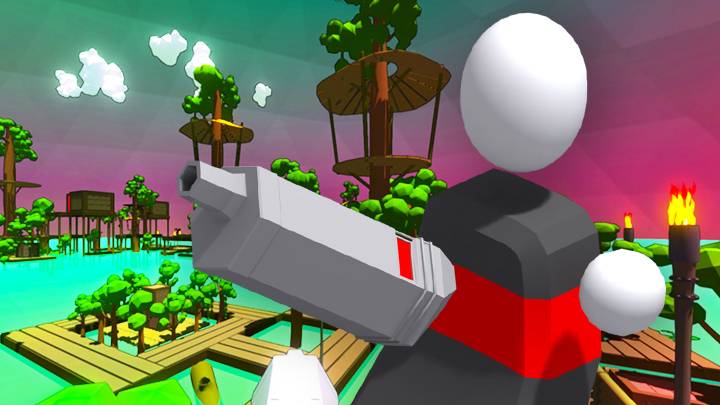Gods have it rough. They get praised and berated all the time. And more often than not, there’s one guy hell bent on causing the destruction of the gods for whatever reason. Which brings us to Polygod.
You are Faceless the Blessed, a rogue assassin, the last of your kind in the known universe, and on the verge of extinction. To ensure your survival you must battle the minions of malignant Gods and their Holy Champions in an epic event, The Trial of the Gods, in order to attain godhood. It’s a simple premise, supported by some small talk with NPCs over the course of a game, but nothing spectacular.
Now let’s move on to the gameplay.
The immediate comparison to make is with DOOM or Quake due to the centered weapon model, which is not an incorrect statement to make. That said, the overall structure of Polygod is akin to The Binding of Isaac if it were fully 3D and a first-person shooter. The campaign, as it were, is a set of six randomly generated levels, though every playthrough follows a set order in terms of which god that gives you a trial. Six levels sound short, but not only will you die a lot, more on that in a bit, but the randomly generated aspect keeps the game varied to keep you coming back for more, and unlockables like different characters means the game can keep you entertained for a good amount of time, so it doesn’t fall short content-wise.
Every time you begin a playthrough, you’re stuck with a peashooter which is fine at the start but would benefit from an upgrade, seeing as it’s your only weapon; that’s where blessings come in. Every time you kill an enemy, their soul is yours. Souls are currency to be used at randomly placed altars in each level to gain upgrades for your peashooter, with a choice of three every time. A total of 100 upgrades are at your disposal, from health, movement and firing speed boosts to changing the fire mode from a bullet to laser or even bubbles. Some upgrades when stacked can turn your peashooter into, for instance, a rapid fire machine gun or a slow firing, high damage sniper rifle. Upgrade management is a key factor in surviving the trials Polygod brings forth, and the randomization aspect can be quite addicting. That said, much like Minecraft, Polygod uses seeds to determine level layout, and these can be saved if you want to keep a particular layout, so you have some control over that.
Polygod bills itself as a brutally difficult game, a distinction which is debatable. It is true that the early stages of a playthrough can be tough with your default weapon, but the right set of blessings can slice the difficulty in half, and as a player gets better with the game, the difficulty goes further down. That being said, those initial levels can be intimidating to anyone picking up Polygod and force them to undergo a slow, methodical approach, which can make the game frustrating to play at times over how slow one could need to proceed. Still, the difficulty is fair hard, not poorly designed hard. Overall, Polygod’s gameplay can hold up for what it is. It’s a tough nut to crack initially, but when it cracks, the game becomes a lot more fun.
Polygod’s art style explicitly sells itself as inspired by Italian surrealist Girogio de Chirico, revered for his eerie mood and strange cityscapes. A quick Google search of his work shows that the resemblance is there, from the faceless humanoids to the blocky buildings that make up the game’s geometry, and as a homage, it works really well. Viewed through a more critical lens, though, the game can appear bland. The music is also surprisingly calm for a shooter with brutal difficulty, sounding more like something heard in a walking simulator than a balls to the wall roguelike FPS.
Sadly, one huge detriment towards the visuals (and really, the game in general) Polygod is game’s lack of optimization in certain points. The framerate, for starters, chugs at points, a problem mostly noticeable in portable mode, since docked mode is far more consistent. Worst of all, though, is how the game is prone to crashing, mostly in specific instances such as dying, but ones that nonetheless can lock you out of using certain upgrades. For instance, the first boss when killed drops an optional blessing which lets you use dragon fire…or at least it would, since attempting to use it (as of writing) crashes the game. A fix is sorely needed before this game can be enjoyed fully.
Polygod, as a game, has great ideas, perhaps not executed perfectly, but ones that can justify it’s $15 price tag for certain crowds. Unfortunately, this port’s problems with framerate and occasional crashing can make picking up the game a tough recommendation unless one doesn’t mind lost progress or not using certain upgrades. It’s a scenario similar to the initial release of the Switch port of Morphite, another indie FPS which was great in everything else but had an inconsistent framerate which bogged down the experience at first. Otherwise, Polygod is worth the time for rougelike and FPS enthusiasts; just wait for a fix first to ensure your experience goes smoothly.









